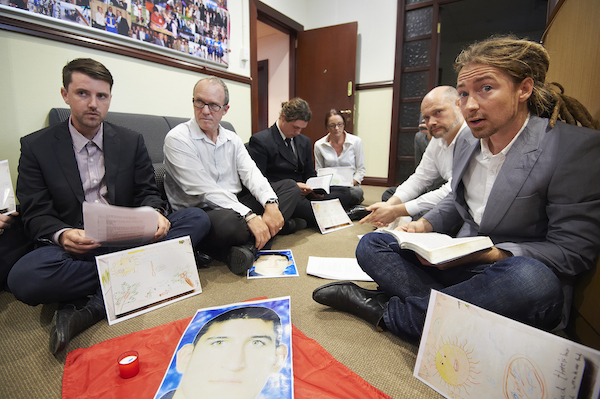For Pastor Peter Barney, it was the task of overseeing the children at Perth’s Riverview Church that motivated him to take action.
“I had been thinking over the last month, wow, imagine if we were locking-up all these children instead of opening up rooms for them, having fun with them and having a great time at church. Imagine if we were punitively locking them up. And that for me became a real spur to action,” Barney says
The action that Barney took, along with 10 other Christian activists, was to stage a sit-in at the offices of the Minister for Foreign Affairs, Julie Bishop to protest the ongoing detention of children and families who attempt to come to Australia as refugees.
Despite avoiding having convictions recorded, the unlikely lawbreakers have now been found guilty of trespass in a Perth Magistrates Court and have each been required to pay a $50 fine.
Chris Bedding, an Anglican priest — and part-time stand-up comedian — was one of the activists arrested in Bishop’s office. He says the decency he and fellow activist were shown by the Australian justice system provides a sad contrast to that offered to asylum seekers hoping to be processed as refugees.
“I suppose that really made it stand out to us, the way that we can so easily access a system and be treated with such respect when there’s all these people in detention centres who are denied basic legal representation,” Bedding says.
In the wake of further revelations about Australia’s detention regime, including a report into the death of Iranian asylum seeker Reza Barati and the announcement of cuts to the Refugee Council, which advocates on behalf of refugees, Bedding predicts that similar protests and direct-action campaigns will continue.
“I think there will be more sit-in style protests. I don’t know where they will be, or when. But I think it’s inevitable, given the gravity of the issue,” he says.
Other similar protests this year have already targeted the offices of the Prime Minister, the Leader of the Opposition and the Minister for Immigration and Border Protection. Religious groups are emerging as a major voice of opposition to the harsh treatment of refugees by the Australian Government, with Anglican Archbishop Jeffrey Driver speaking out against detention policies in April, and other groups offering varying levels of concern.
The Bishop office sit-in was organised by Christian activists involved in the grassroots Love Makes A Way campaign in April. Since then, associated groups have been holding workshops around the country to encourage concerned Christians to learn about the history of non-violent direct-action, including the role of American Christians during the US civil rights struggle, and providing resources to empower them to take such actions for themselves.
Barney says the movement has taken inspiration from the “double-win” principle, whereby activists design actions that allow them to put their position to leaders as well as change the broader public’s view of an issue. This means activists strictly avoid violence either to persons or to property, and engage with law enforcement agencies and the targets of their protest in a respectful way. It’s part of a long-term struggle they believe is necessary to bring a humane approach back to one of Australia’s most hotly politicised issues.
“I think non-violent protest is just another way to make sure it stays front and centre, particularly to make people ask that question, 'hang on, why are children in detention? Why are families in detention?'” Barney says.
During the sit-in, activists had conversations with staff and police about the cruelty of Australia’s detention system and the dangers of keeping over 1,000 children behind bars. Highlighting their dedication to changing minds through conversation and education, Bedding says they even tried to start conversations with staff and other defendants as they faced their charges in the Magistrates Court.

Bedding believes their approach is bringing a new group of activists into the fold.
“I have been at various teachings here in Perth for local groups, who are just trying to get their head around what non-violent action looks like, and the creativity and discipline required,” he says.
In recent months students have grabbed headlines with aggressive protest actions designed to draw attention to issues of public policy — most often education funding — by hosting public displays of dissent, targeting Liberal minsters and forcing inconvenience on the broader public to force them to engage with the issues.
Despite strong opposition from some sections of the community to Australia’s tough stance on those seeking asylum, a January survey found that less than one third of those polled believed asylum seekers should be treated less severely.
In light of the severity of the distress suffered by those in detention already, and the hardened view of the Australian public, Barney concedes it is difficult to know how radical direct-actions should be.
In spite of the weight of public opinion and the bipartisan commitment of the Coalition and Labor to policies of deterrence, Bedding is confident the kind of actions taken by 'Love Makes A Way' are capable of changing the way Australians think about asylum seekers.
“We know we’re in for the long-haul,” Bedding says. “And we’re going to win”.
Donate To New Matilda
New Matilda is a small, independent media outlet. We survive through reader contributions, and never losing a lawsuit. If you got something from this article, giving something back helps us to continue speaking truth to power. Every little bit counts.



